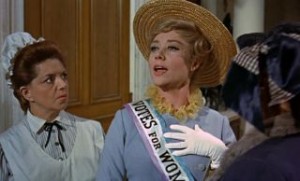More Life Lessons from Mary Poppins
Anyone who read my post Sand Through A Sieve and thought it was inspired genius (well, who can blame you?) may realise that I am quickly coming to regard Mary Poppins as a Parenting Bible.
 Today I put the DVD in and went about my business, tidying up and generally being housewifely (in other words, quite unlike myself) and heard the Suffragette Song come on. You know the moment – and if you don’t I suggest you watch Mary Poppins urgently, there are valuable lessons to be learnt. Mrs Banks comes home after a day’s campaigning for votes for women, and launches into song. Among the many wonderful lyrics (I particularly like ‘Though we adore men individually / We agree that as a group they’re rather stupid…’) the chorus goes like this:
Today I put the DVD in and went about my business, tidying up and generally being housewifely (in other words, quite unlike myself) and heard the Suffragette Song come on. You know the moment – and if you don’t I suggest you watch Mary Poppins urgently, there are valuable lessons to be learnt. Mrs Banks comes home after a day’s campaigning for votes for women, and launches into song. Among the many wonderful lyrics (I particularly like ‘Though we adore men individually / We agree that as a group they’re rather stupid…’) the chorus goes like this:
“Cast off the shackles of yesterday
Shoulder to shoulder into the fray
Our daughters’ daughters will adore us
And they’ll sing in grateful chorus
‘Well done, Sister Suffragettes!'”
This set me off thinking. If my last scan was right, I am expecting my first daughter in approximately 57 days and 7 hours, and it would be nice to think that she will have daughters of her own some day and so on and so forth.
I have had all sorts of nice little fantasies about having a daughter. We’ll go shopping together – she’ll probably teach me more than I will teach her in that department – we’ll have girly moments, painting toenails etc like in Mamma Mia! We’ll finish the dollhouse I started when I was a teenager. She’ll have the voice of an angel and the grace of a ballet dancer. I’ll buy her girly dresses and dolls and she’ll ignore them all and go for the monsters and aliens. I’ll introduce her to Georgette Heyer and Jane Austen and she’ll devour Stephen King and Terry Pratchett. She’ll adore her big brother and be a real Daddy’s girl and the four of us will go out and eat ice cream on the sea front at Whitby in October.
I haven’t really stopped to think about the more profound things I want to teach her. I want her to be strong and assertive, two things I have failed at miserably so far. I want to pass on my faith, but leave her the freedom and conviction to figure out her own beliefs. I want her to think about the world and how she can make it better, so that her daughters’ daughters can look back at her and her generation and think “Wow, what can we do to build upon that?”
I don’t know about you, but I, to my shame, very rarely think about what our ancestors had to fight for to get to where we are now. The whole movement for women’s suffrage in England, for example, fought against the tide of popular opinion and went through arrest, force-feeding, torture, ridicule and even death because they believed it was wrong to deny women an equal say in how their country was run. Do we ever think about those women, and ‘adore them’? As we would like our daughters’ daughters to adore us?
They are, of course, a tiny representation of the people throughout time who have fought for what they believed in. Our own lifetimes throw up a handful of names – Gandhi, Martin Luther King, Rosa Parks, Nelson Mandela. Mother Teresa, fighting against the poverty and injustice she saw every day in India’s poorest. Nameless campaigners out right now, protesting against war and injustice and human rights.
I want my daughter to grow up with a social conscience and awareness. I want her to not be afraid to fight for what she thinks is right. Our ancestresses have left us a legacy of being able to vote, to speak out and be heard. They have given us a platform to speak from, on behalf of women, men and children all over the world who are still being oppressed, and I know I don’t do their efforts justice.
Mary Poppins has reminded me that we also have a chance to leave a legacy, that we will have descendants who will look back at our generation. They can ignore us, despise us or adore us. I would like to think that I and my daughter can still do things that will make our daughters’ daughters adore us after all.
